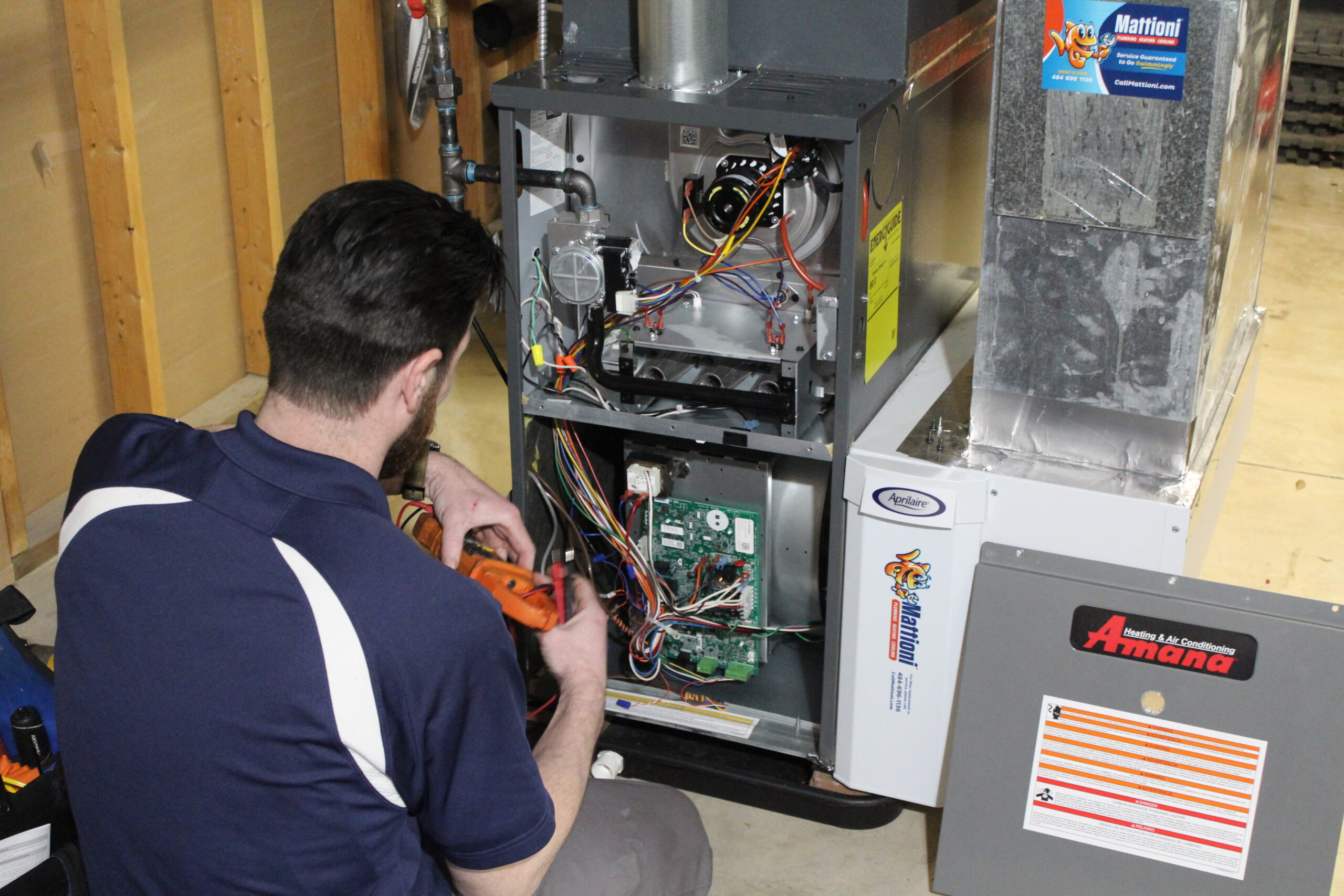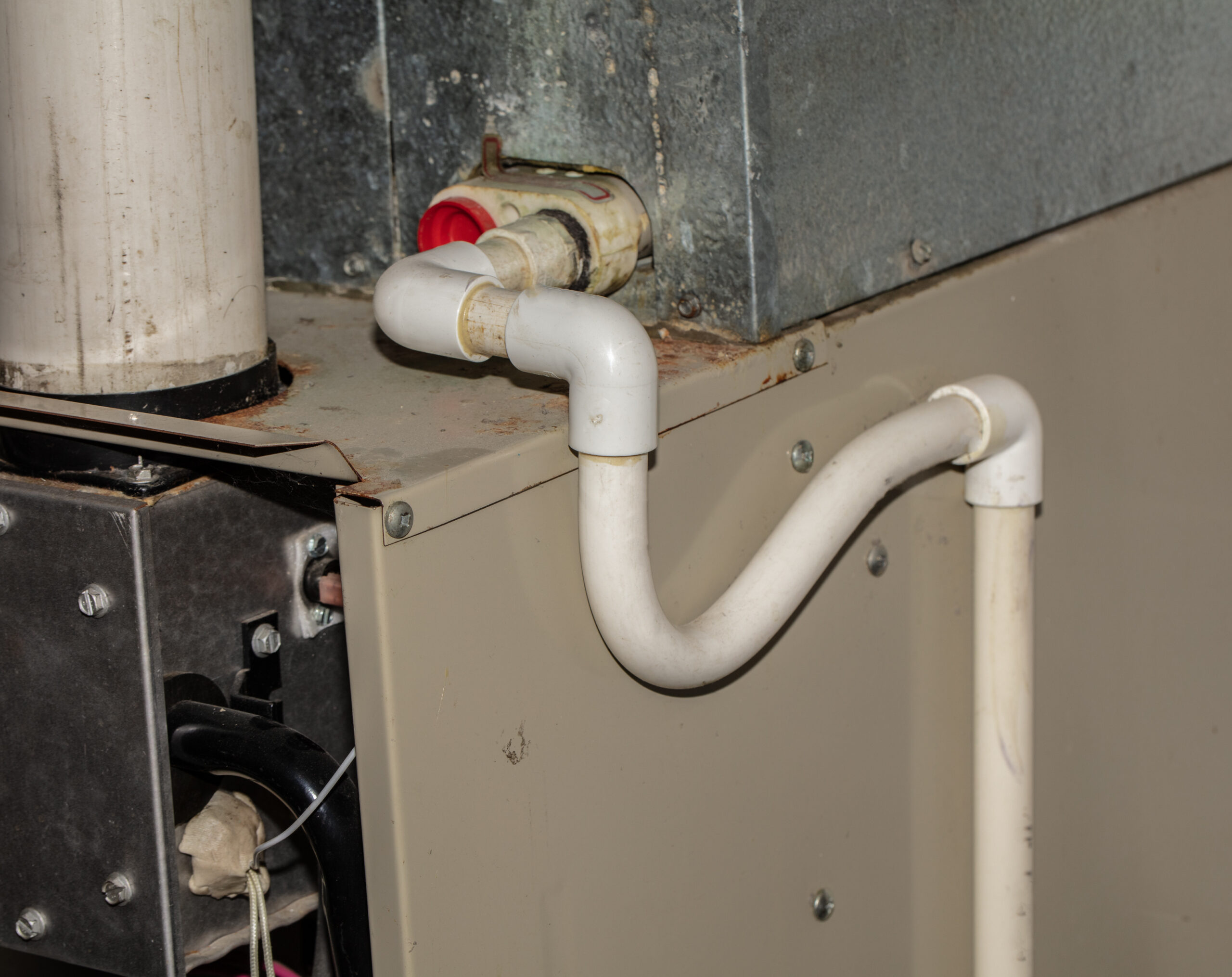Last Revised: 9/2/25
Have you been told to “look for a high AFUE rating” when shopping for a new heating system? Do you feel like everyone assumes you already understand what that means – even though it just sounds like HVAC jargon?
AFUE ratings are more than just a number, they’re a guideline towards the long-term costs and comfort you can expect out of different furnaces and boilers. Naturally, they’re a key consideration when reinvesting in your home’s heating.
At Mattioni, we’ve spent over 75 years helping homeowners make smart, confident decisions about their heating systems. In this article, you’ll learn exactly what AFUE stands for, how it’s calculated, and how it affects your home’s heating efficiency. After reading, you’ll know which AFUE range might make the most sense for your situation – and how to use that number as a tool, not just another spec on a label.
What Does AFUE Stand For?
AFUE stands for Annual Fuel Utilization Efficiency, and it’s a standardized measurement used for furnaces, boilers, and other fuel-burning heating systems. It tells you how efficiently a system converts fuel into usable heat over the course of a typical heating season. For homeowners, it’s one of the clearest indicators of how much energy – and money – a system might waste or save.
Think of it this way: if your heating system has an AFUE rating of 80%, that means 80% of the fuel it consumes turns directly into heat for your home. The other 20% is lost through inefficiencies – usually up a flue chimney or through the system’s internal components. Higher AFUE percentages mean more efficient performance and less wasted fuel.
You can usually find the AFUE rating displayed on the bright yellow EnergyGuide label found on most heating systems. Whether you’re comparing gas, oil, or electric systems, this number gives you a consistent benchmark to evaluate efficiency across different models and brands.
Why AFUE Matters When Choosing a Furnace or Boiler
AFUE isn’t just a number on a label – it’s a direct reflection of how efficiently that furnace or boiler turns fuel into warmth for your home. A system with a low AFUE can potentially waste a significant portion of the fuel you’re paying for.
For example, an 85% AFUE furnace loses 15 cents per every dollar of fuel used. In the same way, a furnace with an AFUE rating of 95% only loses 5 cents per dollar of fuel. The difference between those two systems (and their fuel bills) becomes very real when your heat is running day and night during winter.
But AFUE affects more than just your monthly bills. Higher-efficiency systems – whether furnaces or boilers – often include more advanced comfort features such as variable-speed blowers or modulating burners. These are designed to match your home’s heating needs more precisely and maintain output that better matches your thermostat setting. That means more consistent indoor temperatures, fewer hot and cold spots, and a quieter, smoother heating experience.
Ultimately, AFUE gives you the power to evaluate the costs and comfort of systems in an apples-to-apples comparison so that you can find one that matches your goals.
What’s Considered a Good AFUE Rating?
AFUE ratings span a wide range, and where your furnace falls within that range can tell you a lot about it. Standard-efficiency furnaces and boilers typically offer ratings between 80% and 89%, and they offer a more affordable upfront price but higher long-term fuel costs.
On the other end, high-efficiency furnaces and boilers can achieve AFUE ratings from 90% all the way up to 98%. Furnaces in this range are sometimes called “condensing furnaces” because they use a secondary heat exchanger to extract even more heat from the combustion process, pushing their efficiency much higher.
For homes in colder climates, where the heat is running daily from November through March, choosing a furnace with a higher AFUE rating can offer real value. It means more of the energy you’re paying for actually ends up heating your home – and less of it is escaping through the exhaust.
Is a Higher AFUE Rating Always Worth the Cost?
One of the biggest questions you’ll have to answer when comparing furnace or boiler options is whether the added efficiency of a high-AFUE model will truly pay off. And the answer, as with many home investments, is: it depends.
High-efficiency heating systems generally come with higher upfront cost. But in return, they waste significantly less energy and often come with features that enhance comfort and performance. In many cases, homeowners see the savings from reduced fuel use begin to add up within just a few heating seasons. That’s especially true if you plan to stay in your home long-term, or if energy costs are a major concern.
However, not every situation calls for the highest efficiency model available. If your current heating needs are moderate, or if you plan to move in the near future, a standard-efficiency furnace might be the right fit. The most important factor is making sure the system aligns with both your comfort goals and your financial plan.
If you’re unsure where you fall on that spectrum, we can help. Schedule a free consultation and we’ll walk you through the options that best fit your home’s size, insulation, and heating usage.
What’s Best for You? Understanding Your Priorities
Every home – and every homeowner – has different needs. That’s why the best AFUE rating for one household might not be the right choice for another. Your main priorities to consider will likely include long-term savings, daily comfort expectations, environmental impact, and upfront budgeting.
Making this decision can seem overwhelming, which is why we believe becoming informed is essential. Whether you’re looking for the quiet performance and maximum savings of a 98% AFUE heating system, or the upfront cost savings of an 80% model, we’ll help you evaluate your options based on your goals.
If you’re ready to explore what makes sense for your home, you can get personalized recommendations from one of our licensed professionals. We’ll consider your home’s layout, insulation levels, existing ductwork, and usage habits to help you find the right balance of comfort, efficiency, and cost.
AFUE Ratings: Know the Numbers, Choose with Confidence
Now that you know what AFUE means, and why it matters, you’re in a better position to evaluate heating systems and select one that makes sense for you. This one number can be the key to unlocking better comfort and lower heating bills, especially during frigid winter months.
At Mattioni, we don’t believe in one-size-fits-all answers. We believe in empowering homeowners to make confident, informed decisions with guidance they can trust. Whether you’re replacing an aging system or planning for a future upgrade, our team is here to help you make the call with honesty and clarity.
Ready to take the next step? Schedule a free consultation online or give our team a call with your questions. We’re just a call or click away.


